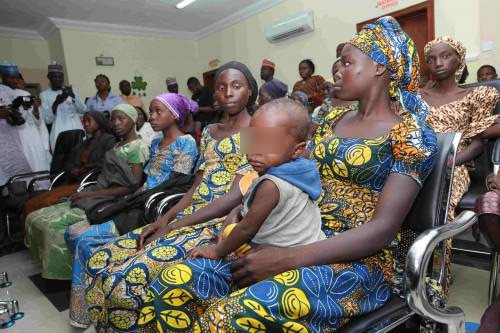‘We don’t want to go back’: 100 Chibok schoolgirls refuse to leave their Boko Haram captors after two years in captivity
*Boko Haram jihadists abducted 276 schoolgirls from Chibok in April 2014
*50 escaped quickly but the others have been held in terrible conditions
*President Buhari of Nigeria negotiated the release of 21 girls last week
*His spokesman said they were hoping another 83 would be freed soon
*But a community leader said 100 of the girls do not want to come back
*They were forced to have babies for their captors and apparently fear the stigma of ‘Boko Haram wives’ if they return
A community leader involved in the negotiations to obtain the release of the schoolgirls abducted from Chibok in northern Nigeria has said more than 100 of them are unwilling to return home.
More than 200 girls were taken from a school in Chibok in April 2014 by members of the extremist Islamist Boko Haram group, who have held them in captivity ever since, forcibly converting many from Christianity.
After 21 of the girls were released last week – possibly following the payment of a ransom – Nigeria’s government is negotiating the release of another 83.
But Pogu Bitrus, chairman of the Chibok Development Association, said more than 100 others appeared unwilling to leave their captors.
He said they were ashamed to return home because they were forced to marry extremists and have their babies.
This video was released by Boko Haram in August. Some of the girls may be be suffering from ‘Stockholm syndrome’, where they identify with and feel affection for their captors
Mr Bitrus said the freed girls have told their parents they were separated into two groups early on in their captivity, when Boko Haram commanders gave them the choice of joining the extremists and embracing Islam, or becoming their slaves.
The latter group – made up of 104 girls – never saw their classmates again.
Mr Bitrus said they were used as domestic workers and porters but were not sexually abused. That group contain the 21 who were released last week and the 83 who the government are negotiating over.
He said the 21 girls freed last week might have to be educated abroad because of the stigma they will face in Nigeria.
The girls were reunited with their parents at the weekend and are expected to meet Nigeria’s President Muhammadu Buhari tomorrow.
Mr Buhari has said his government is prepared to talk with Boko Haram about the release of the remaining girls.
A total of 276 schoolgirls were taken from a school in Chibok by armed men.
Dozens escaped early on and Mr Bitrus said the girls who were released last week have said six more died during their 30 months in captivity.
Mr Bitrus said many of those who escaped two years ago were taunted as ‘Boko Haram wives’ by people in Chibok and had moved away. At least 20 were being educated in the United States.
Mr Bitrus: ‘We would prefer that they are taken away from the community and this country because the stigmatisation is going to affect them for the rest of their lives.
‘Even someone believed to have been abused by Boko Haram would be seen in a bad light.’
One Chibok girl, Amina Ali Nkeki, escaped in May this year.
Yakubu Nkeki, chairman of the Chibok Parents’ Association, said she has been reunited with the 21 freed girls, who were still being treated by doctors, psychologists and trauma counsellors at a hospital in the Nigerian capital, Abuja.
Emos Lawal, whose daughter was freed last week, said his daughter was ‘praying that let the rest of them have the chance to come out.’
One girl in the freed group, who was pregnant when she was abducted, is now a mother of a young child.
Chibok is a small and conservative Christian enclave in mainly Muslim northern Nigeria, where many parents are involved in translating the Bible into local languages and belong to the Nigerian branch of the Elgin, an evangelical church based in the United States.
Nigeria’s government has denied reports the girls were swapped for four Boko Haram commanders, or that a large ransom was paid.
Their abduction in 2014 made headline news globally and US First Lady Michelle Obama joined the #BringBackOurGirls online movement.
Buhari, who hails from the overwhelmingly Muslim and Hausa north of Nigeria, was elected president in May last year.
Despite winning back swathes of territory from the jihadists, President Buhari has faced intense criticism for failing to recover the young captives, who became the defining symbol of Boko Haram’s brutal campaign to establish a fundamentalist Islamic state in the country.
The insurgency has claimed more than 20,000 lives and displaced 2.6 million people since Boko Haram took up arms against the Nigerian government in 2009



Recent Comments